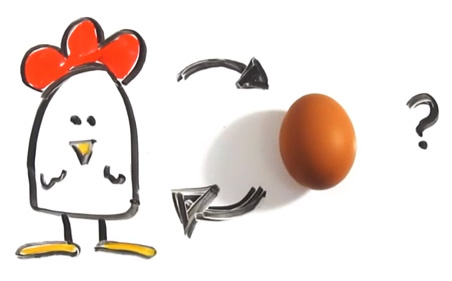The question would be simple if you took it literally, egg laying animals existed long before the chicken came about, so technically the egg came before the chicken. But this question, better worded as the chicken or the chicken egg, focuses more on the cause and consequence. That is, if a chicken came from an egg, where did the egg come from? Another chicken presumably, which too must have come from an egg. So which came first?
Team Chicken
Research suggests that the protein essential for the formation of chicken eggs, called OV – 17, is only found in chicken ovaries, without it the chicken egg shell could not be formed. So without a chicken you technically can't get a chicken egg. But this all depends on the nature and definition of a chicken egg in the first place. After all, is a chicken egg an egg laid by a chicken or one that simply contains a chicken? Obviously the
OV – 17 containing chicken had to come from somewhere, but if an elephant laid an egg from which a lion hatched would be an elephant egg or a lion egg?
This leads to the other side of the story.
Team Egg
During reproduction to organisms pass on their genetic information in the form of DNA, but the replication of this DNA is never 100% accurate and often produces minor changes for the new organism. These minor mutations in DNA over thousands of generations create new species. Mutations influence speciation. But these genetic mutation must occur in the zygote or initial cell. So a creature very similar to a chicken, which we will call the proto – chicken, would have made it with another proto – chicken, and because of a small genetic mutation would have created the first chicken which grew in an egg. So the egg came first?
Well team chicken might argue …. that this was a chicken growing inside of a proto-chicken egg.
However no one mutation can ever really constitute a new species. Even though we humans like to classify all creatures into different groups and names ( domain, kingdom, phylum, class, order, family, genus, species etc.), but this is based on how things currently are and not how they were millions on years ago. The process of evolution is so gradual that no one proto – chicken to chicken birth could really be considered a new species at the time.
Much like how dogs have come from wolves. As humans began to interact with and domesticate wolves there was no one single point where a wolf gave birth to a dog. Rather, as particular traits came about from selective pressures, such as choosing wolves who were not afraid of hums or choosing ones that were less aggressive. Over many generations we can see big genetic and behavioral trait differences. So where does this leave us?
The Two Scenarios
Some early egg laying species gradually led to the creation of the proto – chicken which laid proto – chicken eggs. In one of these eggs there was a mutation causing a slight change and selective advantage and this was ultimately the chicken which then went on to lay chicken eggs. In this case the chicken technically came first.
or...
We have a proto – chicken that gave birth to a chicken in what we classify as a chicken egg and as such, the egg came first.
Which brings us back to the nomenclature and the question of what is a chicken egg, which is a fairly meaningless question. But at the end of the day what we can all agree on is that regardless of whether it was a chicken egg or a proto – chicken egg, the first true chicken came from and egg.
So in the question of which came first – the chicken or the egg?
 |
| The Egg Came First. For my next blog I'm going to explain the science of heartbreak and some helpful tips on how to start over! Thank you xoxo
And for more interesting science info - check out AsapSCIENCE on youtube.
|





No comments:
Post a Comment